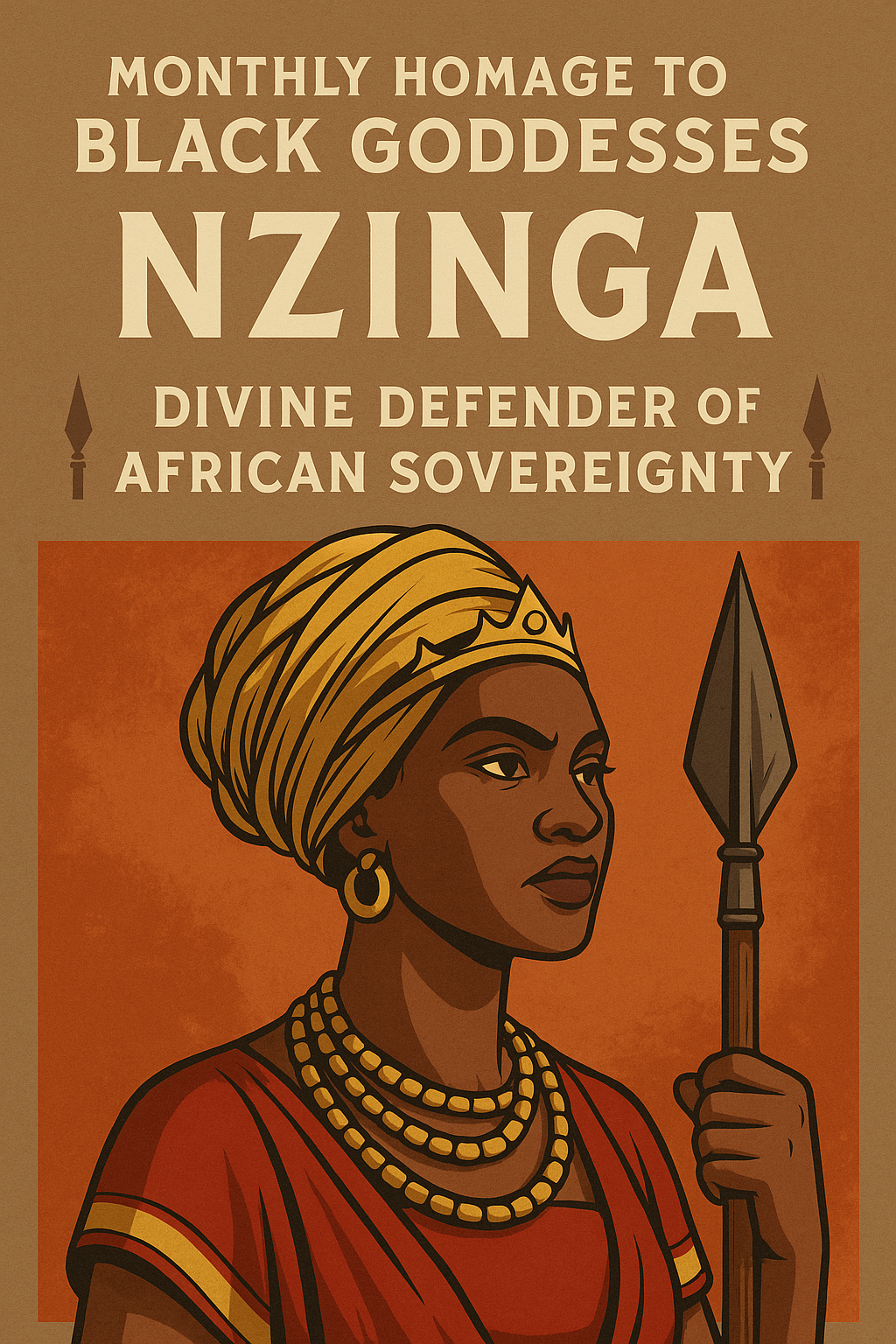Monthly Homage to Black Goddesses: Honoring Nzinga – Divine Defender of African Sovereignty

Welcome to Monthly Homage to Black Goddesses, where we uplift the sacred power of Black womanhood and honor the trailblazing spirits who shaped our herstory. Each month, we call forth a legendary Black woman whose impact transcends time.
This month, we honor Goddess Nzinga Mbande — sovereign of the Ndongo and Matamba kingdoms in 17th-century Angola. She was a diplomat, military strategist, and fierce protector of her people. But above all, she embodied divine resistance — a living testament to the strength and wisdom of the African goddess archetype.
Nzinga didn’t just wear a crown. She was the crown.
Divinely Rooted, Royally Raised
Born in 1583 to the royal Mbundu lineage, Nzinga was trained in leadership, diplomacy, and warfare from an early age — a divine preparation for the spiritual war ahead. As European colonial forces tightened their grip on Central Africa, Nzinga rose not just as a ruler, but as a protector of her people’s soul.
Her mastery of languages, political negotiation, and ancestral wisdom made her a force even colonizers feared.
The Throne Wasn’t Given — It Was Claimed
In one of the most iconic moments in African herstory, Nzinga met with Portuguese officials in 1622. They refused to offer her a seat. Without hesitation, her aide dropped to their knees, forming a human throne beneath her — because even in the presence of empire, a goddess never lowers herself.
That wasn’t ego. That was embodiment.
The Sacred Warrior of Matamba
When her brother died (under mysterious circumstances, as legend suggests), Nzinga assumed the throne — or rather, the altar of leadership. But the colonizers kept pressing. So she traded negotiation for divine warfare.
Nzinga formed alliances with escaped slaves and African warriors, building a resistance movement rooted in justice and ancestral protection. She even took the name “Ana de Sousa” temporarily, using spiritual camouflage to outwit her enemies.
For nearly 30 years, she led one of the longest and most effective resistances against European colonization — a goddess of guerrilla warfare, defending land, spirit, and sovereignty.
Nzinga’s Legacy: A Living Myth, A Lasting Truth
Nzinga transitioned in 1663 at the age of 80. Her legacy, however, didn’t die — it ascended. Today, she is revered as a national hero in Angola, a cultural icon throughout the African diaspora, and a divine symbol of Black resistance, leadership, and power.
When we speak her name, we don’t just remember history — we call on sacred energy.
Her Crown, Her Hair, Her Power
Though much of Nzinga’s appearance was filtered through European depictions, oral tradition remembers her adorned in elaborate natural hairstyles and headwraps, decorated with gold and beads — not as vanity, but as armor. Her hair was her heritage. Her adornment was her protection.
At BlackHairandSkincare.com, we believe your hair is holy. Your coils, curls, and crowns are extensions of ancestral glory — and caring for them is a ritual of remembrance.
Why Goddess Nzinga Still Matters
Nzinga reminds us that Black women don’t just survive — they reign, resist, and rise. She is proof that strategy and spirit go hand-in-hand. That softness and strength are not opposites. That being divine is not about perfection — it’s about power with purpose.
And when they refuse to give us a seat, we build a whole new temple.
Until Next Time, Goddesses…
Join us next month as we continue to honor the sacred lineage of Black Goddesses who walked this earth with purpose, passion, and power. And remember: your hair is not just hair — it’s your heritage.
Honor your crown. Care for your roots. Channel your inner Nzinga.


0 comments